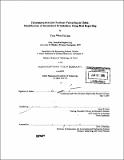Telecommunications business venturing in China : identification of investment orientations using deal reporting
Author(s)
Lim, Tony Whey Yit
DownloadFull printable version (7.076Mb)
Other Contributors
Massachusetts Institute of Technology. Technology and Policy Program.
Advisor
James E. Short.
Terms of use
Metadata
Show full item recordAbstract
China's recent entry into the World Trade Organization (WTO) in December 2001 has lent speed to an ongoing series of market reforms that has opened up the massive Chinese domestic market to the world. The thought of China selling its products and services freely in global markets in exchange for opening up its own growing domestic market of 1.2 billion people is staggering and demands for business and policy decision makers to have an understanding of China's unique investment landscape. Centering on technology venturing in the telecommunications sector in mainland China, this research identifies and analyzes patterns of deal-making and strategies that motivate business investments in the technology space in mainland China. Three investment orientations - cost- minimization, domestic market-driven and joint development - are proposed and verified using the research data. Data was collected on all publicly-reported deals in China, published in business reporting services in the English language including the China Business Review, Reuters, Investext, Dow Jones, and The Economist Intelligence Unit. Objective data on deal attributes was matched with subjective and evaluative data on strategies and expected deal significance. By performing content analysis and statistical analysis on the data collected, results were obtained regarding the investment orientations in mainland China of two companies, UTStarcom Inc. and Nortel Networks Corp. It was found that significant differences existed in the objective and subjective attributes of telecommunications business ventures in China. (cont.) The two companies that were studied exhibited all proposed investment orientations, including the third joint development orientation that is emerging and directing investments into Sino-foreign partnership opportunities that jointly developed 3G products for the international market. There is a decreasing trend in number of Sino-foreign import contracts and an increasing trend in Sino-foreign exports in telecoms. These results point to the emergence of Chinese telecom companies that compete strongly in the Chinese marketplace and in international markets. Three deal drivers are identified from the deals that were studied, along with several possible risk-bearing changes that might result from policy influences in China. Difficulties in tracking deals are described and the implications of the research findings from a business and policy perspective are discussed.
Description
Thesis (S.M.)--Massachusetts Institute of Technology, Engineering Systems Division, Technology and Policy Program, 2005. Includes bibliographical references (p. 97-102).
Date issued
2005Department
Massachusetts Institute of Technology. Engineering Systems Division; Technology and Policy ProgramPublisher
Massachusetts Institute of Technology
Keywords
Technology and Policy Program.